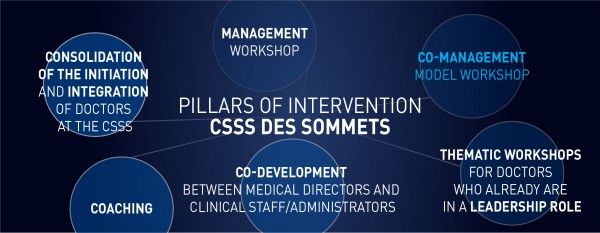Here is the latest article from our series on the CSSS des Sommets!
CSSS des Sommets serie:
The collaboration between doctors and administrators: a relationship on the mend (1/5)
How entrepreneurial philanthropy helped the CSSS des Sommets (2/5): initiation of doctors
The objective: To help you discover a form of philanthropic intervention and implication in the health sector.
After addressing the consolidation of the initiation and integration of doctors, here is another article on incentive management workshops that will soon be presented to CSSS des Sommets' doctors.
Understanding management
To put a medical co-management model in place in an establishment, the group intervening quickly realised that they first had to get the doctors interested in management. In fact, the implementation of our third pillar of intervention, the creation of dyads of medical managers, already required doctors to have a good understanding of the advantages of efficient management and teamwork. (
Tweet this)
With these incentive workshops in management, the first goal is to make the doctors aware of the aspects of management involved in our health system and in the local CSSS organization.
We explain for example, where the medical component is positioned within the organizational structure of the health system, what the role of managers and doctors should be, how doctors can contribute to the better management of our system, etc.
Work tools
The workshop also provides useful tools to help doctors improve the way they manage themselves on a daily basis:
- Better understanding of management issues. Role and qualities of a good manager.
- Definition and discussion around the different medical committees in place at the CSSS des Sommets.
- Presentation of management tools for individual and group meetings.
- Training for facilitating a meeting.
The purpose of all this is to
demystify the administrative aspect and to make it gratifying and attractive for doctors who are first and foremost clinicians.
Using a participatory presentation style, we will tackle a variety of subjects: reflecting on the continuity of services in the CSSS, the 6 leadership styles according to Goleman or the 10 principles for managing change.
By selecting competencies relevant to management, human resources or leadership, the doctors are made aware of the importance of management and as a result, of the co-management model that is so crucial.
Our next article will present our third intervention pillar on the building of medical-manager dyads. We will explore how these dyads will help improve the efficiency of a health establishment.
Do you think it's important to raise awareness among clinicians about the importance of management?

